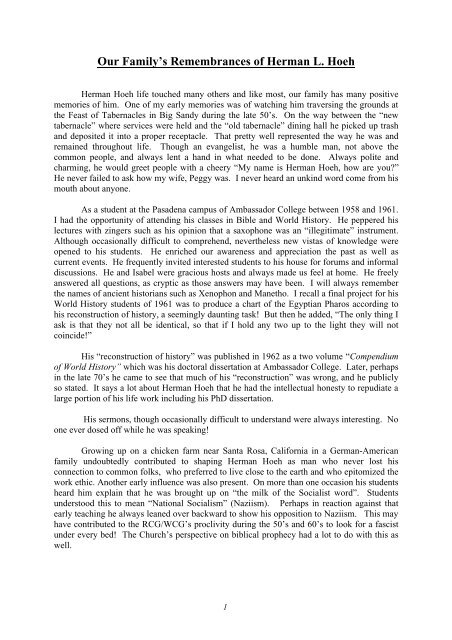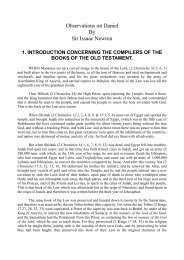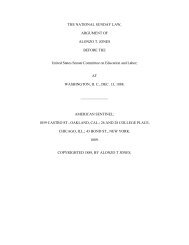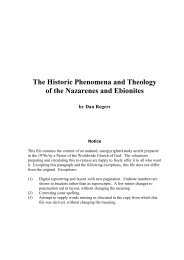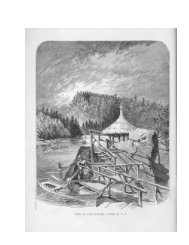Herman Hoeh Remembered-1-05.pdf - Origin of Nations
Herman Hoeh Remembered-1-05.pdf - Origin of Nations
Herman Hoeh Remembered-1-05.pdf - Origin of Nations
Create successful ePaper yourself
Turn your PDF publications into a flip-book with our unique Google optimized e-Paper software.
Our Family’s Remembrances <strong>of</strong> <strong>Herman</strong> L. <strong>Hoeh</strong><br />
<strong>Herman</strong> <strong>Hoeh</strong> life touched many others and like most, our family has many positive<br />
memories <strong>of</strong> him. One <strong>of</strong> my early memories was <strong>of</strong> watching him traversing the grounds at<br />
the Feast <strong>of</strong> Tabernacles in Big Sandy during the late 50’s. On the way between the “new<br />
tabernacle” where services were held and the “old tabernacle” dining hall he picked up trash<br />
and deposited it into a proper receptacle. That pretty well represented the way he was and<br />
remained throughout life. Though an evangelist, he was a humble man, not above the<br />
common people, and always lent a hand in what needed to be done. Always polite and<br />
charming, he would greet people with a cheery “My name is <strong>Herman</strong> <strong>Hoeh</strong>, how are you?”<br />
He never failed to ask how my wife, Peggy was. I never heard an unkind word come from his<br />
mouth about anyone.<br />
As a student at the Pasadena campus <strong>of</strong> Ambassador College between 1958 and 1961.<br />
I had the opportunity <strong>of</strong> attending his classes in Bible and World History. He peppered his<br />
lectures with zingers such as his opinion that a saxophone was an “illegitimate” instrument.<br />
Although occasionally difficult to comprehend, nevertheless new vistas <strong>of</strong> knowledge were<br />
opened to his students. He enriched our awareness and appreciation the past as well as<br />
current events. He frequently invited interested students to his house for forums and informal<br />
discussions. He and Isabel were gracious hosts and always made us feel at home. He freely<br />
answered all questions, as cryptic as those answers may have been. I will always remember<br />
the names <strong>of</strong> ancient historians such as Xenophon and Manetho. I recall a final project for his<br />
World History students <strong>of</strong> 1961 was to produce a chart <strong>of</strong> the Egyptian Pharos according to<br />
his reconstruction <strong>of</strong> history, a seemingly daunting task! But then he added, “The only thing I<br />
ask is that they not all be identical, so that if I hold any two up to the light they will not<br />
coincide!”<br />
His “reconstruction <strong>of</strong> history” was published in 1962 as a two volume “Compendium<br />
<strong>of</strong> World History” which was his doctoral dissertation at Ambassador College. Later, perhaps<br />
in the late 70’s he came to see that much <strong>of</strong> his “reconstruction” was wrong, and he publicly<br />
so stated. It says a lot about <strong>Herman</strong> <strong>Hoeh</strong> that he had the intellectual honesty to repudiate a<br />
large portion <strong>of</strong> his life work including his PhD dissertation.<br />
His sermons, though occasionally difficult to understand were always interesting. No<br />
one ever dosed <strong>of</strong>f while he was speaking!<br />
Growing up on a chicken farm near Santa Rosa, California in a German-American<br />
family undoubtedly contributed to shaping <strong>Herman</strong> <strong>Hoeh</strong> as man who never lost his<br />
connection to common folks, who preferred to live close to the earth and who epitomized the<br />
work ethic. Another early influence was also present. On more than one occasion his students<br />
heard him explain that he was brought up on “the milk <strong>of</strong> the Socialist word”. Students<br />
understood this to mean “National Socialism” (Naziism). Perhaps in reaction against that<br />
early teaching he always leaned over backward to show his opposition to Naziism. This may<br />
have contributed to the RCG/WCG’s proclivity during the 50’s and 60’s to look for a fascist<br />
under every bed! The Church’s perspective on biblical prophecy had a lot to do with this as<br />
well.<br />
1
The 50’s and 60’s seemed to spawn a mindset <strong>of</strong> a separation between “us and the<br />
world” in RCG/WGC circles. That mentality was conspicuously absent in <strong>Herman</strong> <strong>Hoeh</strong>. He<br />
consistently made contact with many individuals <strong>of</strong> varied backgrounds and different<br />
perspectives, building bridges across pr<strong>of</strong>essional, denominational, religious, national and<br />
ethnic lines. One was Rabbi Zvi Ankori who did his doctoral dissertation on the<br />
interpenetration <strong>of</strong> Judaism and Zoroastrianism. He invited Dr. Ankori into his home for an<br />
informal discussion with his students. I felt it to be an honor to be one <strong>of</strong> those invited. Dr.<br />
Ankori went on to become a well known author on Jewish issues. Another was Jean Pierre<br />
Hallet, the Belgian anthropologist and humanitarian who publicized the plight <strong>of</strong> the Pygmies<br />
in the Congo. He was author <strong>of</strong> Pygmy Kitabu. I saw him on several occasions at fundraisers<br />
to help the Pygmies. He always voiced his appreciation for <strong>Herman</strong> <strong>Hoeh</strong>’s help with<br />
printing a brochure on the Pygmies and fundraising assistance for the Pygmy Project.<br />
Another contact was with a Swedish-born biochemist and visionary, Dr. Eric Eweson. A<br />
pioneer in composting and waste management from the 1940’s, Dr. Eweson’s expertise led to<br />
the construction and installation <strong>of</strong> the “Eweson Digester” on the Big Sandy campus which<br />
turned garbage and other waste into fertilizer. His talk before an Ambassador student<br />
assembly opened my eyes to the potentialities <strong>of</strong> composting and the desirability <strong>of</strong> organic<br />
farming. Another well respected personality, a dentist named Dr. Royal Lee imparted much<br />
useful information at a student assembly on health and nutrition. His company, Standard<br />
Process Laboratories is a producer <strong>of</strong> high quality nutritional supplements. Many more<br />
contacts could be cited from various fields including historians, archaeologists and writers.<br />
Many people have benefited from the associates <strong>of</strong> <strong>Herman</strong> <strong>Hoeh</strong>.<br />
<strong>Herman</strong> <strong>Hoeh</strong> <strong>of</strong>ten spoke <strong>of</strong> his friendship with John Weidner, a Seventh Day<br />
Adventist, who owned two health food stores in Pasadena. He affectionately called him “his<br />
best friend in the world”. Mr. Weidner, a Belgian, shared some <strong>of</strong> his World War II<br />
experiences at an Ambassador student assembly. He was one <strong>of</strong> the many who rescued Jews<br />
during the Nazi occupation <strong>of</strong> France. Wanting the best foods for his family, he would<br />
frequently shop at Weidner’s Health Foods. One time my wife, Peggy was there while he<br />
was shopping. After paying, he told the sales lady to “Keep the change!”, throwing the whole<br />
sales staff into turmoil! They did not know how to handle that! Everyone agreed that<br />
<strong>Herman</strong> <strong>Hoeh</strong> was a very generous man!<br />
During the late 60’s the <strong>Hoeh</strong>’s moved from their South Orange Grove house in<br />
Pasadena to La Canada. A few years later they purchased two houses in Tujunga, California.<br />
One house for them and one for his library! He wanted as much as possible to return to his<br />
roots where he could have a garden and keep goats. After moving to Tujunga my wife and I<br />
gave them an old refrigerator in which to keep their garden produce and goat milk. After<br />
delivering it in our pick-up truck he stated, “You have treated us well, and now I have a treat<br />
for you!” He treated both <strong>of</strong> us to a refreshing glass <strong>of</strong> cold goat milk!<br />
I spoke by phone with <strong>Herman</strong> <strong>Hoeh</strong> about a month before he died. His mind was as<br />
sharp as ever. We chatted about many things. At first I hesitated to mention my years <strong>of</strong><br />
research into the meaning to the Christian <strong>of</strong> the feast days. Personal theological research by<br />
a lay person was once frowned upon. I did mention that I had felt for many years that there<br />
was much more meaning there than WGC had uncovered. He reacted favorably. I then said<br />
that my research was aided by several books on the feast days including one that predated<br />
HWA’s booklet. He asked who wrote it and I told him the author was Louis Talbot. He<br />
replied that he used to listen to him on the radio during the 1940’s, and wanted to know if he<br />
2
and any good insights as to their meaning. I answered that he did. Anyway this shows that he<br />
was open-minded toward new ideas.<br />
My wife and I feel privileged to have known <strong>Herman</strong> L. <strong>Hoeh</strong>. He was a genuinely<br />
caring, remarkable and multi-faceted individual. Our lives were enriched by his, and he will<br />
be missed.<br />
Robert Macdonald<br />
19 January 2005<br />
Postscript:<br />
3<br />
Printed in The Journal<br />
Dr. <strong>Hoeh</strong> was a fascinating figure in RCG/WGC circles. His sermons, though sometimes<br />
perplexing were never boring. My wife and I had the occasion to recall a sermon he gave<br />
over 40 years ago. Few ministers preached sermons so long ago that made such an<br />
impression. A show on the SciFi channel on Atlantis brought to mind a sermon he gave on<br />
Atlantis. The show featured several locations <strong>of</strong> ongoing investigations on where Atlantis<br />
may have been, and mentioned that many other locations had been proposed.<br />
Dr. <strong>Hoeh</strong> proposed that Atlantis was located in the North Sea <strong>of</strong>f the coast <strong>of</strong> Germany. In<br />
this scenario most <strong>of</strong> the island <strong>of</strong> Atlantis had sunk, leaving a remnant on the side toward the<br />
continent, a small island known as Heligoland.<br />
Actually it has divided a few years back into two islands. He pointed out that Atlantis could<br />
have not been in the Mediterranean Sea as sometimes proposed because Plato described it as<br />
being beyond the Pillars <strong>of</strong> Hercules.<br />
He went onto suggest that Atlantis was actually an Israelite colony, pointing out that the name<br />
Heligoland means Holy Land. However he did not quote Plato when he said that Atlantis had<br />
disappeared 9000 years before his time.<br />
Dr. <strong>Hoeh</strong>’s research sometimes spilled over into the classroom and his sermons. This may<br />
have been the case in his sermon on Atlantis. As far as I know he never mentioned it again.<br />
He did mention Heligoland in the Compendium, but not in connection with Atlantis.<br />
Robert Macdonald<br />
15 July 2006


